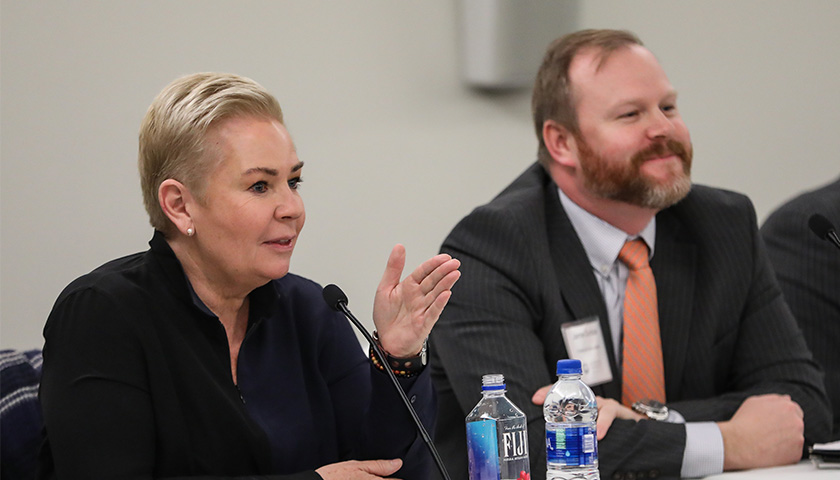Midterm Post-Mortem

Mary Anne Marsh and Jamie Dunbar were two of the panelists at this year's Moakley Breakfast.
Midterm Post-Mortem
A week after the 2018 midterm elections—with many races around the country still being counted—Suffolk University’s Moakley Breakfast Series Forum brought together a group of political experts to analyze what happened, what didn’t happen, and what it all means for the commonwealth and the country.
Panelists included Gus Bickford, chairman of the Massachusetts Democratic Party; Jamie Dunbar, senior vice president at O’Neill and Associates; Charles Glick, principal and founder, Charles Group Consulting; Mary Anne Marsh, principal, Dewey Square Group; and Richard Taylor, director of the Sawyer Business School’s Center for Real Estate.
The panelists agreed that the midterms were a referendum on the presidency of Donald Trump, which resulted in surprising Democratic wins around the country, but especially in suburban areas—places that in recent decades have typically voted Republican.
“This election was a repudiation of Donald Trump. Full stop,” said Marsh. “And this election was led by women, who started the week after Trump took the White House and marched on Washington. Then they decided to go home and run for office.”
Thirty-five new women legislators will be joining 66 female incumbents, making it the largest group of women in Congress ever. Heading to Washington are the first person of color in the Massachusetts delegation (Ayanna Pressley); the first-ever Muslim congresswomen; the first-ever Native American congresswomen; the first-ever Latina congresswomen; and many more.
The panel explored how, here in Massachusetts, the Trump referendum wasn’t all-pervasive—that there was a seeming contradiction as voters overwhelmingly reelected a pragmatist Republican governor while simultaneously returning a left-leaning Democratic senator.
“Voters sent a message that they’re judging Baker based on his four years, not Trump’s two years,” said Glick.
“The governor had tremendous support, but it was an inch thick,” added Bickford, pointing out that Baker, unlike many other candidates around the country, didn’t stir up an anti-Trump feeling, which took away a key strategy for the Massachusetts Democrats. “That was always our Achilles heel,” Bickford said, speaking of the party’s plan to take back the corner office in 2018.
This cycle also saw record voter turnout—the most since 1966—which bodes well for the “year of the activist citizen,” as Suffolk's own Professor Richard Taylor put it.
That doesn’t mean that all has gone smoothly.
Marsh spoke forcefully against Georgia gubernatorial nominee Brian Kemp, until recently Georgia’s secretary of state, and his handling of voter registrations in that state.
One cloud on the horizon is the Mueller investigation and the impact it will have once it’s released, not just for Trump and anyone else involved. It could have a ripple effect across Capitol Hill and stymie the new Congress’ ability to solve issues that both parties might actually agree on, like infrastructure, the opioid crisis, and health care.
Another question is whether Democrats will use their time to solve issues or investigate Trump. The panelists seemed to agree that the latter could turn voters off yet again, causing a swing back to the right in 2020.
“If the next two years are about payback and obstruction, this electorate is fed up with that,” Dunbar said. “And we might see this seesaw effect for some time.”
Despite those rumblings, the message from the panel was one of optimism about democracy in America.
“That’s the power of the electorate,” said Dunbar. “With so many people voting, you get change.”
Contact
Greg Gatlin
Office of Public Affairs
617-573-8428
Ben Hall
Office of Public Affairs
617-573-8092



